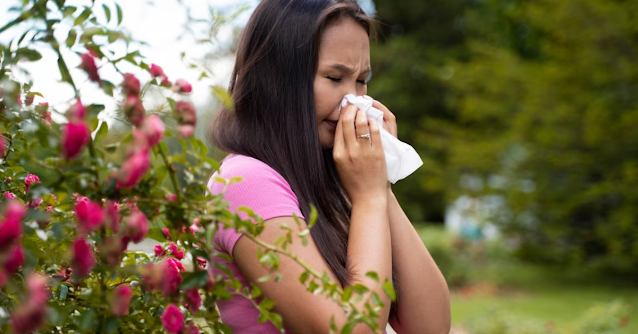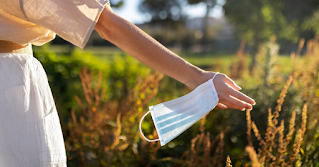Breathe Easy: A Guide to Self- Care for Allergic Rhinitis
Do you find yourself constantly battling sneezing fits, itchy eyes, and a stuffy nose? If so, you are not alone. Allergic rhinitis, commonly known as hay fever, affects millions of people worldwide. But fear not! There are practical self- care techniques that can help you reclaim control over your breathing and live a more comfortable life In this guide, we'll delve into the world of allergic rhinitis, causes, symptoms and explore practical self- care strategies to help you find relief from Allergic rhinitis.
 |
| Allergic rhinitis |
Understanding Allergic rhinitis :
Common Causes of Allergic Rhinitis
- Pollen
This is one of the most common triggers and varies depending on the time of year. Trees, meadows, and weeds release pollen during specific seasons.- Dust Mites
These bitsy creatures thrive in household dust, bedding, and upholstery. They're a significant inner allergen. - Pet Dander
Proteins set up in skin cells, slaver, and urine of pussycats, tykes , and other furry faves can spark antipathetic responses. -
Mold Spores
Mold grows in damp environments and releases spores into the air. Inhaling these spores can lead to allergic symptoms. -
Other Allergens
Some individuals may be sensitive to other substances like cockroach droppings, certain foods, and insect venom. Common Symptoms of Allergic Rhinitis
- Sneezing Frequent
uncontrollable sneezing is a hallmark symptom.
- Watery or Stuffy Nose
This is frequently accompanied by clear, watery nasal discharge or congestion. -
Itchy or Watery Eyes
The eyes may become red, itchy, and watery.
- Itchy Throat or Ears
Some individualities may witness itching in the throat or ears. A patient cough may develop, especially at night.
- Fatigue
Chronic nasal congestion and disintegrated sleep can lead to day fatigue. Excess mucus may drop down the reverse of the throat, causing irritation.
-
Reduced Sense of Smell or Taste
Ongoing nasal congestion can affect the senses. - Ear congestion or Popping
Some individualities may experience pressure changes in the ears.It's important to note that symptoms can range from mild to severe and may vary in intensity depending on the individual and the specific allergens involved.
Self care for Allergic rhinitis:
1. Identify Your Triggers
The first step in managing allergic rhinitis is to identify the specific allergens that trigger your symptoms. Common lawbreakers include pollen, dust mites, pet dander, and mold. Once you know your triggers, you can take proactive way to minimize exposure.2. Keep Your Environment Clean
Maintaining a clean living space can significantly reduce allergen exposure. Regularly vacuum carpets, wash bedding in hot water and and use high-efficiency particulate air (HEPA) filters in your home Place it in the bedroom or other frequently used areas to insure cleaner air.This simple yet effective step can make a world of difference in your comfort level
3. Manage Outdoor Exposure
4. Invest in Allergen- Proof Covers
5. Practice Nasal Irrigation
 |
| Nasal irrigation |
6. Stay Hydrated
Drinking plenitude of water helps keep the mucous membranes in the nasal passages wettish, which can palliate vexation and ease congestion. Aim for at least 8-9 glasses of water a day.
7. Choose the Right Medications
Over-the-counter antihistamines, decongestants, and nasal corticosteroids can effectively manage antipathetic rhinitis symptoms. However, it's pivotal to consult with a healthcare professional to determine the best treatment plan for your specific requirements
8. Practice awareness and Stress Reduction
Stress can complicate antipathetic rhinitis symptoms. Engaging in awareness ways, like deep breathing exercises and meditation, can help calm your nervous system and palliate stress, leading to a reduction in mislike- related discomfort.
9. Avoid Smoke and Strong Odors
Smoke, whether from cigarettes or other sources, can complicate allergic rhinitis symptoms. Additionally, strong scents or scents can irritate nasal passages, so try to avoid them.
10. Monitor Symptoms and Seek Professional
Advice Keep track of your symptoms and note anychanges.However, consult a healthcare professional for farther evaluation and treatment options, If symptoms persist or worsen despite self- care measures.
Natural Remedies for Allergic Rhinitis
While medical treatments are available for Allergic rhinitis but some individualities prefer natural remedies to alleviate their symptoms. Here are several effective approaches-
Local honey
Using local honey for allergic rhinitis is a popular natural remedy. The idea is that consuming honey made from local flowers may help your body build a tolerance to the pollen in your area, potentially reducing allergy symptoms. However, it's important to note that scientific evidence supporting this is limited. If you decide to try it, make sure to consult with a healthcare professional, especially if you have severe allergies or other health concerns.- Quercetin- Rich Foods
Quercetin, a natural plant pigment that has anti-inflammatory properties, can be found in foods like apples, berries, onions, and green tea. Quercetin, a major antihistaminic and antiallergic useful for allergic rhinitis. Including these in your diet may help reduce allergic reactions. It reduces the reaction to allergies by blocking a chemical substance in the body. This material is especially used in the treatment of nose, eyes and tongue. Quercetin is found in rich foods and provides expected benefits to users.- Butterbur
Butterbur is an herb that has shown promise in relieving allergy symptoms. It may work as a natural antihistamine. still, consult a healthcare professional before use, as some kinds of butterbur may contain compounds that are dangerous. - Probiotics
Steam inhalation is an effective remedy recommended for allergic rhinitis. It involves inhaling the heat generated by an au or sugar ball placed in hot water through the nose. This action helps to moisten and soften the breathing material in the nasal cavity, thereby providing relief from nose and throat problems. Adding a few drops of eucalyptus oil can increase the effectiveness of this remedy. It is worth noting that it only provides immediate relief. and should be done according to individual medical advice
- Vitamin C
Vitamin C can be an important remedy for allergic rhinitis. It acts as a natural antihistamine, which helps reduce irritation in the body and controls allergic reactions. This important antioxidant present in citrus fruits, strawberries and bell peppers may help reduce allergy symptoms. It has anti-inflammatory properties that can reduce nasal congestion. Vitamin C boosts the immune system in the indoor climate and may help with immunity against allergies. Therefore, consuming vitamin C regularly may be suitable for allergic rhinitis.
- Essential Oils
Certain essential oils like lavender, eucalyptus, and peppermint retain natural anti-inflammatory and decongestant properties. Diffusing them in your living space or diluting them for topical use may offer relief. - Bromelain
Bromelain, a wonderful natural remedy for allergic rhinitis. Bromelain in pineapple is an enzyme that has anti-inflammatory properties. Some studies suggest that it may help reduce allergic reactions when taken as a supplement. Bromelain relieves bronchitis and catarrh and improves healing of the respiratory tract. It can be helpful in controlling allergic reactions and provides relaxation and enjoyment of existence to the users.
- Fundamental Herbal Remedies for Allergic Rhinitis
Allergic rhinitis is a common problem that causes swelling and inflammation of the nasal passages. Here are some natural herbal remedies that can help control this problem.Basil leaves:
Chewing basil leaves clears nasal congestion.
Shankhapushpi:
Taking its powder with honey provides relief from rhinitis.
Jal Neti:
Putting warm salt water in the nose provides relief from dry cough and cold.
Frequently Asked questions:
Q 1: What is Allergic Rhinitis?
Ans. Allergic rhinitis, commonly known as hay fever, is an allergic reaction that occurs when the immune system overreacts to allergens like pollen, dust mites, pet dander, or mold spores. It leads to symptoms like sneezing, runny or stuffy nose, itchy or watery eyes, and throat irritation.
Q 2: How can I manage my Allergic Rhinitis symptoms?
Ans. Avoid Allergen Exposure: Minimize contact with allergens by keeping windows closed, using air purifiers, and keeping indoor spaces clean and dust-free.
Monitor Pollen Levels: Stay aware of local pollen forecasts, and try to stay indoors during peak pollen times.
Use Nasal Saline Rinses: These can help clear mucus and allergens from your nasal passages, reducing congestion.
Q 3: Are there any dietary changes that can help with Allergic Rhinitis?
Ans. Consider incorporating foods rich in antioxidants and anti-inflammatory properties like fruits, vegetables, and omega-3 fatty acids. Avoiding dairy products may also help reduce mucus production for some individuals.
Q 4: Can over-the-counter medications help?
Ans. Yes, antihistamines, decongestants, and nasal corticosteroids are commonly used to relieve symptoms. However, it's crucial to consult a healthcare professional for proper dosage and suitability.
Q 5: Are there any natural remedies for Allergic Rhinitis?
Ans. Local Honey: Some people find relief from consuming local honey, as it may contain trace amounts of pollen that can help build tolerance.
Butterbur Extract: This herbal supplement has shown promise in reducing allergy symptoms, but consult a healthcare provider before use.
Q 6: How can I manage Allergic Rhinitis during specific seasons?
Ans. During high pollen seasons:Shower and Change Clothes After Being Outside: This helps remove pollen from your skin and clothes.
Keep Windows Closed: Especially on windy days when pollen is more likely to be in the air.
Q 7: When should I seek professional medical help for Allergic Rhinitis?
Ans.If your symptoms are severe, persist despite self-care efforts, or if you experience additional concerning symptoms like fever or difficulty breathing, it's crucial to consult a healthcare professional for proper diagnosis and treatment.
Conclusion :
Living with allergic rhinitis does not mean you have to abdicate yourself to a life of constant discomfort. By implementing these self- care strategies, you can take proactive way towards breathing easy and enjoying a advanced quality of life. Flash back, it's always best to consult with a healthcare professional for substantiated advice and treatment options. Then is to a future filled with clear skies and easier breathing!






Post a Comment